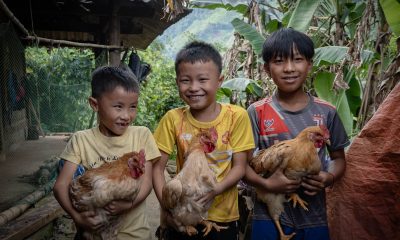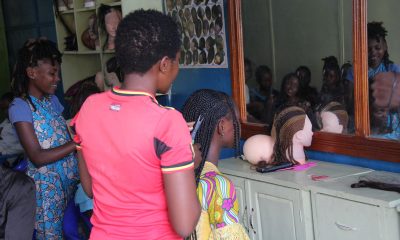Agriculture training in Cambodia helps families in poverty
The Cambodian farmer pumped water from the well into two metal water pails, filled them to the brim, and hoisted the bamboo carrying pole across his back. With a hand on each of the heavy pails to help steady his balance, Seth Sorn headed to the vegetable garden near his bamboo house.
At 70 years old, Sorn still works hard for his family. He’s a rice farmer, just like his father and most other families in the village.
Before Samaritan’s Purse taught Sorn how to grow vegetables, his family relied only on income from the rice crops, and it wasn’t enough. Being a rice farmer is hard work that doesn’t always produce a significant return.
“We lacked money to start other farming,” said Sorn’s wife, Sokueang. “People in the area would buy food for my kids.”
Sokueang and Sorn struggled to provide for their family until our staff members helped point them to a better future.
Model Farming
Until our Food for Life project came to Sorn’s rural, remote Cambodian village, he only knew how to grow rice. We provided crop seeds and taught him to grow vegetables such as morning glory, cabbage, eggplant, spinach, and cucumber.
“I have plenty of food for my family now,” he said. “I don’t have to worry about having enough to eat.”
Sorn walked around his garden and pointed out mango, guava, and jackfruit trees from Samaritan’s Purse. Our staff members taught this dedicated farmer how to be a successful fruit tree planter. We also gave his family a few piglets and materials to build a chicken coop and taught him how to raise pigs and chickens.
Sorn is one of our “model farmers.” A model farmer receives the most training and start up seeds so that he can in turn train others in his village. Samaritan’s Purse staff members build relationships with model farmers and empower them to be examples of solid agricultural practices.
“I am teaching about 25 families in the village,” Sorn said. “They are all growing vegetables.”
With his income from selling vegetables, Sorn has bought chickens and more piglets. He is even able to do more for his children.
“I can support my son to study in Phnom Penh,” he said. “He is studying agriculture and may come and take over here.”
Sorn and his wife are thankful for a livelihood to leave their children and grandchildren. Their family is growing fast, and Sorn had to pause when asked for the number of his grandchildren.
“Let me count,” he said and then smiled and laughed. “I have eight.”
Sorn doesn’t have to worry anymore about taking care of his children and grandchildren. His farm and legacy of hard work and love will carry on to the next generation.







